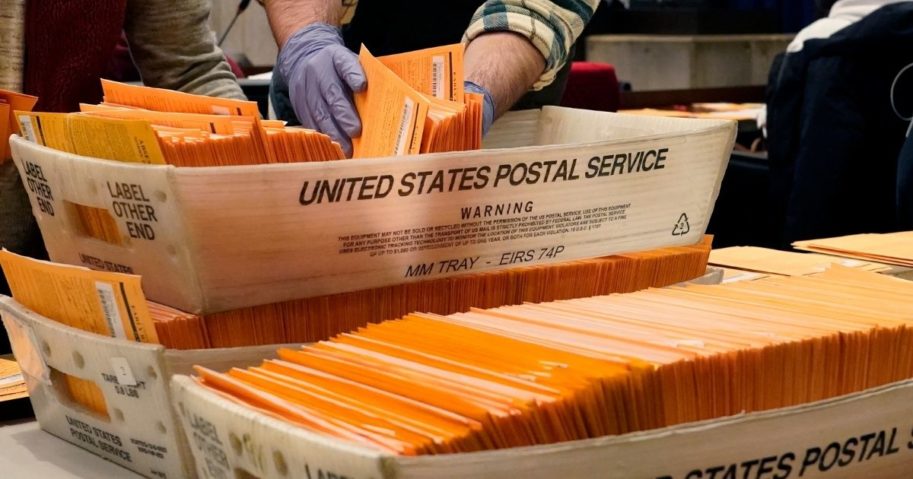A majority of Supreme Court justices appeared inclined during oral arguments Tuesday to uphold provisions in Arizona law banning so-called ballot harvesting and requiring voters to cast ballots in the correct precincts.
“All six conservative justices, appointed by Republican presidents, suggested they would throw out an appellate ruling that struck down the restrictions as racially discriminatory under the landmark Voting Rights Act,” The Associated Press reported.
“The three liberal members of the court, appointed by Democrats, were more sympathetic to the challengers.”
In 2020, the 9th U.S. Circuit Court of Appeals ruled the two measures violated the 1965 Voting Rights Act because banning the two practices disproportionately impacted Hispanic and Native American voters, according to the Arizona Republic.
Arizona Republican Attorney General Mark Brnovich appealed the case, which was brought by the Democratic National Committee and other plaintiffs, to the Supreme Court.
If the Supreme Court rules to uphold the Arizona laws, it would have nationwide implications for Democrats seeking to use the Voting Rights Act to strike down state laws they find discriminatory.
Brnovich defended the state’s provisions, emphasizing that the bans on ballot harvesting and out-of-precinct voting were put in place to ensure the integrity of the state’s elections, SCOTUS Blog reported.
Justice Neil Gorsuch questioned Jessica Amunson, representing Democratic Arizona Secretary of State Katie Hobbs why preventing voter fraud isn’t a valid state concern.
“Does Arizona have to wait for fraud to occur in Arizona,” Gorsuch asked, “using a practice before it can outlaw it?”
Amunson responded that Arizona has “already has a law prohibiting fraudulent ballot collection” and that the law in question before the court “criminalizes neighbors helping neighbors deliver ballots” and doesn’t “get at the state’s interest in preventing fraud.”
Gorsuch appeared skeptical, according to SCOTUS Blog.
Chief Justice John Roberts pointed to a 2005 report on federal election reform by a commission chaired by former President Jimmy Carter and former Secretary of State James Baker, which found absentee ballots can be ripe for fraud.
Roberts noted that the commission “said that absentee ballots are the largest [source] of potential voter fraud” and “recommended that the practice of allowing candidates or party workers to pick up and deliver absentee ballots should be eliminated.”
Justice Samuel Alito expressed concern about the floodgates that could be opened if the Democrats’ standard of striking down voting laws merely because they impact different groups differently were adopted.
“People who are poor and less well-educated on balance probably will find it more difficult to comply with just about every voting rule than do people who are more affluent and have had the benefit of more education,” he said, according to The Wall Street Journal.
The AP reported that Justice Elena Kagan “asked a series of questions that seemed to be aimed at other restrictions that could find their way to the court, including reducing time for early voting and eliminating polling places.”
Michael Carvin, representing the Arizona Republican Party, said the examples Kagan raised “have never existed in the real world.”
Hobbs tweeted Tuesday, “Equal access to the ballot should not be a partisan issue. Today, at the Supreme Court, my office argued to safeguard the voting rights of all Arizonans and to protect the provisions of the Voting Rights Act that empower people to challenge discriminatory election laws.”
Equal access to the ballot should not be a partisan issue. Today, at the Supreme Court, my office argued to safeguard the voting rights of all Arizonans and to protect the provisions of the Voting Rights Act that empower people to challenge discriminatory election laws. https://t.co/ttUmssr91N
— Secretary Katie Hobbs (@SecretaryHobbs) March 2, 2021
Brnovich told KTAR-FM he “felt like it was a pretty good day” before the Supreme Court.
“The argument went really well today. And based on the questioning, I think that the courts seemed sympathetic, or they seemed inclined towards our argument,” he said.
“We just want to make sure that when there is commonsense election integrity measures that preserve people’s right to vote while maintaining confidence in the results, that those laws are upheld,” Brnovich added. “That’s all we’re asking.”
Story cited here.
























